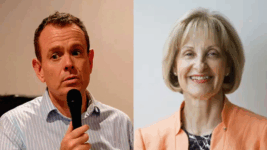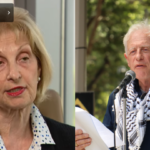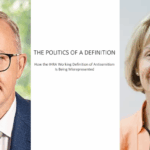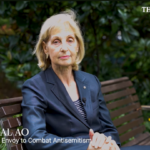Envoy’s Antisemitism Plan is Manifestly Lacking in Substance

Following her 4 July 2025 appearance before the New South Wales parliamentary inquiry into Antisemitism in the state, antisemitism envoy Jillian Segal released her Plan to Combat Antisemitism on the 10th of that month, and in light of this, committee member NSW Labor MLC Stephen Lawrence issued her with a series of questions on notice regarding it, and her recent responses are sketchy to say the least.
The questions on notice relate to some of the stated claims in the plan, which are the stated claims that have been made in the public sphere ad nauseum by those suggesting there is an antisemitism crisis in this state and therefore, laws and policies, or a plan like the envoy’s, should be rolled out to address this supposed rising issue.
The peculiar aspect to the suggested current crisis in antisemitism in NSW, as opposed to any other form of racism or religious prejudice, is that it has coincided with the two-year-long Israeli state’s mass slaughter of Palestinian civilians in the Gaza Strip, while Segal considers, and wants the nation to enact into law, that certain criticism of the colonial nation of Israel do represent antisemitism.
For his part, Lawrence has been thorough in his job as committee member, which is to ask questions to gain a greater understanding of witness testimony, however, the Telegraph has demonised him over this, reporting earlier this month that so far he’s intervened to ask 320 questions during the inquiry, and he was also criticised for having his photo taken with Palestinian advocates.
Segal’s recently published responses to questions on notice reveal that the Special Envoy to Combat Antisemitism is proposing an overhaul of Australian political and social systems, so they have a focus on antisemitism, which represents prejudice towards adherents of Judaism, and this is no evidence-based suggestion, but rather relies upon her simple assertions and those of the Israel lobby.
A dearth of concrete evidence
The envoy’s antisemitism plan proposes that the nation adopts at all levels of government the IHRA (International Holocaust Remembrance Alliance) working definition on antisemitism, which has been shown to have been given “official” status fraudulently, and is known to include criticism of the Israeli state as amounting to antisemitism. And this line can be run because Israel is a Jewish state.
Segal is a Zionist. Zionism is the late 1880s political doctrine calling for a settler colonial Jewish state to be established on historic Palestine. Not all Jews are Zionists. Not all Zionists are Jews. There are more Christian Zionists in the USA, than there are Jewish Zionists. And the IHRA definition serves to conflate hatred towards Jews with political critiques of Israel and hence, deflect this criticism.
Lawrence, a well-known Sydney barrister, quizzed Segal on notice in respect of the evidence and research the plan is based upon, the Jewish organisations she consulted in producing it, whether any of these organisations were non-Zionist, the statistical findings supporting her propositions and proof of her claims that foreign interference has been propagating Jewish hatred at Australian universities.
But Segal doesn’t give substantial answers. She often refers to the “research commissioned”, “clear evidence”, “credible concerns” and even “a leading market research firm”. The point is, Lawrence is raising the assertions made by the Israel lobby in the public sphere without evidence, and he’s asking for the citations or proof and even with time to respond from home, the envoy provides none.
In her plan, Segal further suggests that she be charged with monitoring the media and universities for antisemitism, with funding for the latter made dependent on being Jewish-hatred-free, so the lawyer asked for ten of the most serious examples of antisemitism on uni campuses and her answer is that the “recommendation is precautionary, principled and for government to implement”.
The holocaust in Gaza
To be termed antisemitic is so deplorable a claim because it carries the depravity of the Nazi holocaust against the Jewish people of Europe in World War II, which saw over six million Jews murdered out of prejudice towards their adherence to Judaism. During her testimony to the inquiry, however, Lawerence did note that Segal considers modern antisemitism has a focus on Israel.
Segal states that in terms of the IHRA definition, criticism of Israel is fine, but when it strays into calling for the destruction of the 1948 established Israeli state that is when it strays into antisemitism, because it is a Jewish homeland.
Yet in practice, antisemitism definitions that incorporate certain criticisms of Israel, then serve to conflate all criticisms of that nation and the doctrine of Zionism as being antisemitic.
Lawrence went on to quiz Segal as to whether stating that Israel is committing genocide is an antisemitic act, to which she counters that “alleging genocide is not inherently antisemitic, but when such language is used to delegitimise Israel’s existence, deny Jewish peoplehood, or justify violence toward Jews, it crosses into antisemitism”.
Further questioning results in clarification that the term apartheid is misapplied to Israel and it is antisemitic in application, that academics should be able to debate Israeli policy but not in a prejudicial way, while as to why she considers herself “an impartial and objective person so as to be properly playing a quasi‐governmental role”, this is not her opinion, it is that of the government.
As for what she would say to assertions that she is “a long‐term public protagonist on the side of Israel in the Australian public debate on relevant issues of Australian foreign and domestic policy” and therefore, she is “not an appropriate person to be playing such a role”, and she “has a tendency to further contribute to polarised and divisive perspectives”, Segal rejected these claims.
“Policing political opinion”
The NSW barrister then questions the antisemitism envoy on whether she considers it right to constrain Australians to the IHRA antisemitism definition, which would likely restrict them from raising the idea of a secular state being established in historic Palestine, or a one-state solution, that would result in equal rights for all people living there: Jews, Muslims, Christians and atheists.
Segal initially responded by stating that the “IHRA definition is already the accepted definition of the Australian government”, but she then conceded that any prejudice involved in the idea of a ‘one-state equal rights for all’ solution might portend would depend on “the context, intent and impact, particularly if it denies Jewish self‐determination”.
Lawrence then points out that Kenneth Stern, one of the key drafters of the original antisemitism definition that is today referred to as the IHRA definition, has recommended against governments adopting it, as he’s warned it has been weaponised to prevent criticism of Israel, and rather than address this, Segal counters that over 40 democratic nations have adopted the dodgy definition.
The lawyer puts it to the envoy that “conflating Zionism, Judaism and Israel and criticism of Israel with antisemitism, in an attempt to rebuff criticisms of Israel” is leading to the rise in antisemitism in NSW, and indeed, labelling people who criticise Israel as antisemites is exacerbating the situation. Yet, Segal insists this is not the fault of those doing the conflating but rather that of the antisemites.
However, Federal Court Justice Angus Stewart recently ruled in Wertheim versus Haddad that anti-Zionism, or criticism of the political doctrine underpinning the Israeli state, as well as straightout criticism of Israel, is not antisemitic at all. The judicial officer ruled that “political criticism of Israel, however inflammatory or adversarial, is not by its nature criticism of Jews in general”.
And in his penultimate question to Segal on notice, the NSW Labor upper house member asked whether the envoy accepted that she has “contributed to this conflation”, via her work as envoy and in her previous role “as past president of the Executive Council of Australian Jewry”, and he also wondered how she might have “since sought to avoid these conflations”.
The envoy, who was appointed by the prime minister in July 2024, then responded, “No, I do not accept that. My work has always been guided by clear distinctions between legitimate political critique and antisemitism. The plan is built on the government adopted IHRA definition, which explicitly protects free expression, while identifying when criticism becomes hate.”
“My focus has been – and remains – protecting Jewish Australians from antisemitism, not policing political opinion.”







